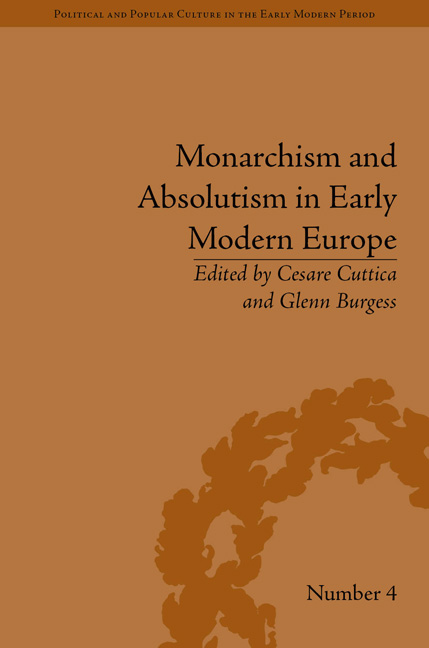Book contents
- Frontmatter
- CONTENTS
- Acknowledgements
- List of Contributors
- Introduction: Monarchism and Absolutism in Early Modern Europe
- Part I Royalists, Republicans, Patriarchalists: English Thinkers at Odds in the Seventeenth Century
- Part II Absolutism, Cynicism, Patriotism: Eighteenth-Century Enlightenment Reflections
- Part III Absolutism, Monarchism, Despotism in Theory and Practice: Contested Historiography and Comparative Approach
- 8 Early Modern Absolutism in Practice and Theory
- 9 An Absolutist Trio in the Early 1630s: Sir Robert Filmer, Jean-Louis Guez De Balzac, Cardin Le Bret and Their Models of Monarchical Power
- 10 Tyrants, Absolute Kings, Arbitrary Rulers and The Commonwealth of England: Some Reflections on Seventeenth-Century English Political Vocabulary
- Part IV Monarchy, the State of Nature, Religion and Iconography in European Perspective
- Notes
- Works Cited
- Index
10 - Tyrants, Absolute Kings, Arbitrary Rulers and The Commonwealth of England: Some Reflections on Seventeenth-Century English Political Vocabulary
from Part III - Absolutism, Monarchism, Despotism in Theory and Practice: Contested Historiography and Comparative Approach
- Frontmatter
- CONTENTS
- Acknowledgements
- List of Contributors
- Introduction: Monarchism and Absolutism in Early Modern Europe
- Part I Royalists, Republicans, Patriarchalists: English Thinkers at Odds in the Seventeenth Century
- Part II Absolutism, Cynicism, Patriotism: Eighteenth-Century Enlightenment Reflections
- Part III Absolutism, Monarchism, Despotism in Theory and Practice: Contested Historiography and Comparative Approach
- 8 Early Modern Absolutism in Practice and Theory
- 9 An Absolutist Trio in the Early 1630s: Sir Robert Filmer, Jean-Louis Guez De Balzac, Cardin Le Bret and Their Models of Monarchical Power
- 10 Tyrants, Absolute Kings, Arbitrary Rulers and The Commonwealth of England: Some Reflections on Seventeenth-Century English Political Vocabulary
- Part IV Monarchy, the State of Nature, Religion and Iconography in European Perspective
- Notes
- Works Cited
- Index
Summary
The linguistic turn in historical inquiry was taken by scholars of early modern political thought, some at least, a good while ago. For many years the attention given to discursive habits and linguistic contexts has rivalled that once devoted to kings and battles, or to social classes and economic foundations. But rather less effort than might have been expected has been devoted directly to the examination of political vocabulary; and the impact of conceptual history (Begriff sgeschichte) on English historians has perhaps been rather muted too. One can speculate on the reasons: the existence of the Oxford English Dictionary might be taken to render the former inquiries redundant; the approaches to political thought established by J. G. A. Pocock and Quentin Skinner might have been an impediment to the reception of conceptual history. Be that as it may, this chapter is a very preliminary sketch of some features of English political vocabulary in the seventeenth century, in the form of a conceptual history (though not necessarily a conceptual history of a type that would be acceptable to Reinhard Koselleck and other scholars of Begriff sgeschichte).
This chapter emerges from work begun in collaboration with other scholars and funded by the British Academy. Its starting point was an idea (adapted from earlier proposals by Phil Withington, Cathy Shrank and Jennifer Richards) of working on a lexicon of ‘keywords’ in early modern English socio-political language, though its discussions moved a long way from this.
- Type
- Chapter
- Information
- Monarchism and Absolutism in Early Modern Europe , pp. 147 - 158Publisher: Pickering & ChattoFirst published in: 2014

